Graham Reid | | 8 min read
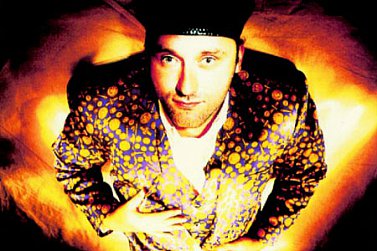
The message had a kind of
road-to-Damascus ring to it: “Jah will meet you at Bethnal Green
tube station next to the ticket counter.”
And there he is: Jah in jeans and a
sweater. Not quite what Rastafarians have in mind. But, accidentally
or not, this child of Stepney’s working class streets has chosen an
appropriate nom-de-rock because, once behind the doors of his modest
two-up two-down nearby in a street remarkable only for its dreary
ordinariness, it is philosophy which Jah Wobble – one-time bassist
with Public Image Ltd and now ambient-trance master, remixer and
bassist without portfolio -- is more than happy to discuss.
Yes, he’s got a new album out -- the
blend of world music and ambience on Heaven and Earth which features
Chinese flute players alongside former Transglobal Underground singer
Natacha Atlas, keyboardist Bernie Worrell, guitarist Nicky Skopelitis
and jazz saxophone giant Pharoah Sanders.
And yes, he’s remixed Brian Eno
tracks for the Spinner album. And yes, he’s in a bit of a rush
because he’s just finished writing a requiem and tonight the string
players come in for the first time.
But as the room grows rapidly dark
around 4.30 pm on this chilly afternoon, he settles back with a cup
of tea and talks about Sinead O'Connor and William Blake, football
and prayer -- and what has drawn him to the swirling North African
sounds which have elevated his recent albums.
While the soothing, understated Heaven
and Earth fits right into current world music/trance-ambient trends,
Wobble’s earliest experiments in the field predated even
quick-off-the-mark chaps like Peter Gabriel.
He traces that to picking up North
African music while fiddling with a shortwave radio as a kid and
feeling himself intuitively drawn to it. He tells of the composer
Stockhausen going to Japan and, on his return, making music which
others said was influenced by the experience. Stockhausen’s reply
was no, he’d discovered the Japanese within himself.
It's an anecdote Wobble enjoys because
it mirrors his experience as well.
“At that time you ’adn’t heard
that North African stuff ’ere, that’s only come in the last
decade or so with a couple of big mosques. It was that thing where
you hear something and it’s so familiar. It's so fuckin'
frustrating to talk about . . . as within, so without, this thing
called an inner world And this music awoke that spark where you
become aware of something inside of yourself.
“I believe we've got so many
personalities inside of us and maybe it takes a quantum leap of
consciousness to awaken it, but there’s a universality to it –
sometimes you just hear the more folkloric aspects of it. Music is
linked to a place and man is linked to the earth.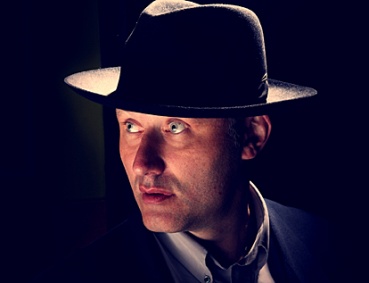
“The [local] culture thing is there
in the front but the deep thing is the universality, the linking
thing.
“That North African music really
awoke something in me, anything that inspires me tends to be the
divine on the move. There is the feeling of the eternal, that which
is always present and has a consciousness to it.”
He laughs aloud at how such esoteric
talk is received in the studio; “I know what they think of me- ‘He
talks a lot of shit sometimes!' -- but they know they can also say,
‘Would you mind if I try this chord?' because they know I'm not
going to say no.
“I'll prattle away sometimes but it
works and sometimes you don't want the same old thing or to be that
specific about what you want. It’s about setting the conditions and
sometimes it’s more about coming out of the intellect and more into
the body.”
Setting those conditions means allowing
for the accident, being open to possibilities by not anticipating a
desired result and keeping the ego in check.
“The ego’s very clever and always
coming up. I heard it described by some Tibetan geezer like, ‘You
should embark on a spiritual path and the ego says it’s a great
idea and it’ll come along with you’ and then it takes over. But
this world now is a very nice time really, there are a lot of people
coming into consciousness.
“There’s an authenticity about the
way people are doing things, they are comfortable and developing
their own ideas and hopefully not like a butterfly flitting.
“That's why I’ve got a lot of time
for people that follow one discipline – that‘s a very practical
thing to do."
Wobble himself doesn’t ascribe to any
particular school of thought (“very much a personal experience”)
but says he does pray: “Prayer is very much an action, music’s a
form of prayer. The prayer is like, ‘Here we go and don’t let any
shit get in the way.’
“I don’t pray for Tottenham to win
or nothin’! It’s about getting the music through. And I think
music comes from beyond the intellect and ego. That idea is more
prevalent in the Middle East, there are certain musics and musicians
that work with eternity and God-consciousness. Maybe it’s because
the religion – for better or worse -- supports the culture which
infects the music, whereas here it’s all Lady Di.
“You can still find those things
about eternity in the West but you have to have a big heart. It's a
more solitary path but it’s a great thing when you find it. The
thing is about being ready to receive.”
Wobble’s spadework has seen him work with an extraordinary number of diverse musicians over the years; from borrowing Sid Vicious' bass as an 18-year-old before joining John Lydon’s noise-merchants PIL to work with German avant-garde types like Holger Czukay, the Edge and Jaki Leibezeit through his Invaders of the Heart Band (who scored a hit with the mantra-like, Sinead-sung Visions of You) to remixes and collaborations with the Orb, Bjork, Massive Attack and most recently the Spinner album with Eno.
It’s hardly surprising, then, when he
ticks off his formative musical interests that Miles Davis'
hard-edged urban funk of the early Seventies co-existed with the
experimental approaches of Can, dub reggae and soukous music from the
West Indies (“it felt like my indigenous music from all over the
world”) and the pure noise that PIL sometimes explored.
Yet curiously, for one so drawn to the
exoticism of music from various parts of Africa, he hasn’t been a
great traveller.
Done the touring thing, he says, but
that backpacking or traveling for its own sake is a middle-class
thing to do; working class blokes like him tend not to. And maybe
it’s dangerous for the ego to take something on before you are
ready. And anyway, he’s a pragmatist, too. What needs to happen is
for him to develop and come into consciousness so he can take on the
karma of this place -- London, music, this time -- rather than look
for a guru or answer elsewhere.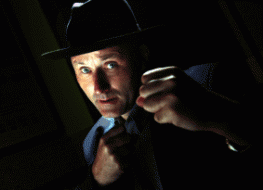
Ever the tough-nosed East Londoner
then?
“Oh yeah,” he laughs, “There's
that division in people's lives between spirituality and practicality
– but for me it's got to be practical to be spiritual. It's got to
be efficient, which doesn't mean cold and robotic. Efficient is love
at work, efficient is things working and when you work there should
be some warmth and love there.
“I think basically I talk the way I
do is because I've been exposed to some of those philosophies in
practice. When that openness was there the experience could happen.
“By dropping pre-conceived ideas you
give yourself the right to miracles and see the way laws of music,
say, will work. I can talk about that rather than sit down and say
all the clever things I've thought up.”
What Jah Wobble has been thinking up
recently is a spiritually impelled music delivered by the likes of
Sinead (“great singer, she's really loud but accurate - pretty
scary the volume!”) and Natacha Atlas. And a spoken word album of
William Blake’s poetry.
“I heard ‘Tiger, Tiger, burning
bright’ years ago on TV and thought it was just – you know that
middle-class delivery – like an actor. I thought it was some tosser
trying to hunt a tiger. And a couple of mates I knew from college
said, ‘You gotta check this geezer out, he’s the man.’
“So I done some readings and some
music for that.”
And the remix album for Eno?
“That was different because it was
just a load of stuff sent over on a DAT and I love that. I’d met
‘im only a couple of times before, so this thing come out the
blue.” .
Why you then?
“I dunno, I forgot to ask 'im.
Afterwards I met him and said, ‘Did you like the stuff then?' He
said yeah and I forgot to ask why he thought of me. It was incredibly
enjoyable because of this thing like people say about a cycle over a
10-year period and this brought back feelings I had in my early 20s
about music and pure atmosphere, because that was a time when I was
listening to really
Miles [Davis] stuff – and stuff that
I didn't think was called ambient but was more atmospheric.”
But as the day falls into night and a
requiem beckons it’s time to go back into the working class
suburban streets.
Just a quick question, then; in John
Lydon's autobiography No Irish, No Blacks, No Dogs he dismisses
bass-playing in rock’n’roll as just a big booming noise in the
background.
True, Mr Bass Player?
“It’s not even that! As a kid listening to rock -- and there were some that I liked -- it was just lost because it was a dull little thumping noise behind the root notes. I still hear that where the bass is following the root note. I figure that's uninteresting -- a bass should be worth much more than that. What I think was missing from what I heard when I was young was the syncopation, like in older rock bands the bass was imaginative. Like John Entwistle in the Who.
“Rock’s lost that. Nirvana was the
last proper rock band I liked. They just had it.”
Jah talking about Nirvana?
It figures.

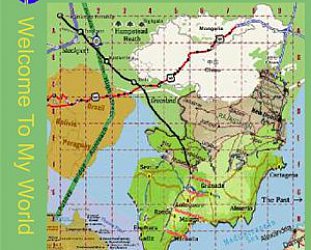
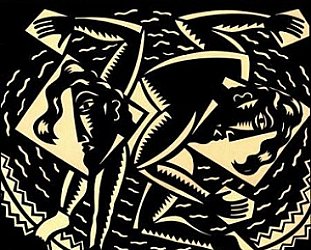

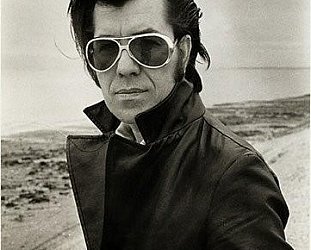
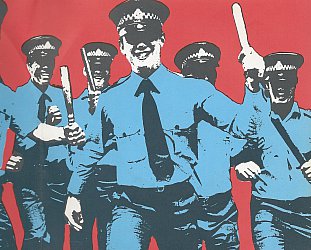
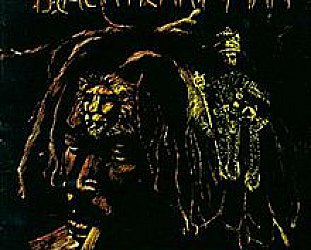
post a comment